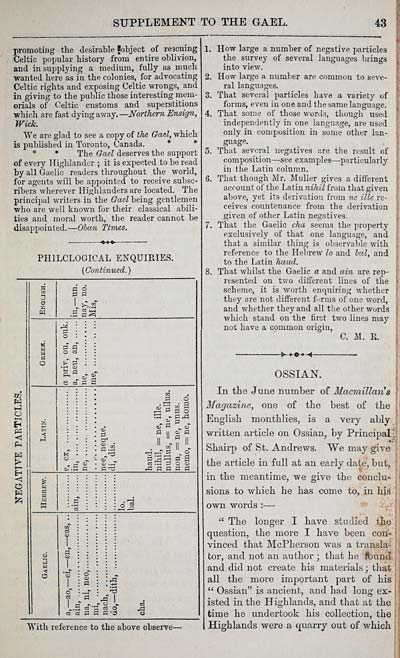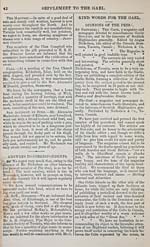Hew Morrison Collection > Gaidheal > 1 Leabh 2 Air
(37)
Download files
Complete book:
Individual page:
Thumbnail gallery: Grid view | List view

SUPPLEMENT TO THE GAEL.
43
promoting the desirable Bobject of re3cuing
Celtic popular history from entire oblivion,
and in supplying a medium, fully as miich
wanted here as in the colonies, for advocating
Celtic rights and exposing Celtic wrongs, and
in giving to the public those interesting mem-
orials of Celtic customs and superstitions
which are fast dyiug eivra.y.— Northern Ensign,
Wick.
"We are glad to see a copy of the Gael, which
is published in Toronto, Canada. * *
* * The Gael deserves the support
of every Highlander ; it is expected to be read
by all Gaelic readers throughout the world,
for agents will be appointed to receive subsc-
ribers wherever Highlanders are located. The
principal writers in the Gael being gentlemen
who are well known for their classical abili-
ties and moral worth, the reader cannot be
disappointed. — Oban Times.
PHILCLOGICAL ENQUIRIES.
{Contimied.)
y, ■ . . ^Ti
" . - • OJ -
in":;::.'
• "3 : • : : S, .
1 M i M
-SI
c3 o"
1. How large a number of negative jiarticles
the survey of several languages brings
into view.
2. How large a number are common to seve-
ral languages.
3. That several particles have a variety of
forms, even in one and the same language.
4. That some of those word.s, though used
independently in one language, are used
only in composition in some other lan-
guage.
5. That several negatives are the result of
composition — see examples — particularly
in the Latin colum.n.
6. That though Mr. Muller gives a different
account of the Latin nihil from that given
above, yet its derivation from ne illc re-
ceives countenance from the derivation
given of other Latin negatives.
7. That the Gaelic cha seems the property
exclusively of that one language, and
that a similar thing is observable with
reference to the Hebrew lo and ha,l, and
to the Latin hand.
8. That whilst the Gaelic a and ain are rep-
resented on two different lines of the
scheme, it is worth enquiring whether
they are not different f-rms of one word,
and whether they and all the other words
which stand on the first two lines may
not have a common origin,
C. M. K.
With reference to the above observe-
OSSIAN.
In the June number of Macmillarbs
Magazine, one of the best of the
English monthlies, is a very ably
written article on Ossian, by Principal '.
Shairp of St. Andrews. We may give
the article in full at an early date, but,
in the meantime, we give the conclu-
sions to which he has come to, in his
own words :—
" The longer I have studied tlie
question, the more I have been con-
vinced that McPherson was a transla^
tor, and not an author ; that he Ibund
and did not create his materials ; that
all the moi'e important part of his
" Ossian" is ancient, and had long ex-
isted in the Highlands, and that at the
time he undertook his collection, the
Highlands were a quarry out of which
43
promoting the desirable Bobject of re3cuing
Celtic popular history from entire oblivion,
and in supplying a medium, fully as miich
wanted here as in the colonies, for advocating
Celtic rights and exposing Celtic wrongs, and
in giving to the public those interesting mem-
orials of Celtic customs and superstitions
which are fast dyiug eivra.y.— Northern Ensign,
Wick.
"We are glad to see a copy of the Gael, which
is published in Toronto, Canada. * *
* * The Gael deserves the support
of every Highlander ; it is expected to be read
by all Gaelic readers throughout the world,
for agents will be appointed to receive subsc-
ribers wherever Highlanders are located. The
principal writers in the Gael being gentlemen
who are well known for their classical abili-
ties and moral worth, the reader cannot be
disappointed. — Oban Times.
PHILCLOGICAL ENQUIRIES.
{Contimied.)
y, ■ . . ^Ti
" . - • OJ -
in":;::.'
• "3 : • : : S, .
1 M i M
-SI
c3 o"
1. How large a number of negative jiarticles
the survey of several languages brings
into view.
2. How large a number are common to seve-
ral languages.
3. That several particles have a variety of
forms, even in one and the same language.
4. That some of those word.s, though used
independently in one language, are used
only in composition in some other lan-
guage.
5. That several negatives are the result of
composition — see examples — particularly
in the Latin colum.n.
6. That though Mr. Muller gives a different
account of the Latin nihil from that given
above, yet its derivation from ne illc re-
ceives countenance from the derivation
given of other Latin negatives.
7. That the Gaelic cha seems the property
exclusively of that one language, and
that a similar thing is observable with
reference to the Hebrew lo and ha,l, and
to the Latin hand.
8. That whilst the Gaelic a and ain are rep-
resented on two different lines of the
scheme, it is worth enquiring whether
they are not different f-rms of one word,
and whether they and all the other words
which stand on the first two lines may
not have a common origin,
C. M. K.
With reference to the above observe-
OSSIAN.
In the June number of Macmillarbs
Magazine, one of the best of the
English monthlies, is a very ably
written article on Ossian, by Principal '.
Shairp of St. Andrews. We may give
the article in full at an early date, but,
in the meantime, we give the conclu-
sions to which he has come to, in his
own words :—
" The longer I have studied tlie
question, the more I have been con-
vinced that McPherson was a transla^
tor, and not an author ; that he Ibund
and did not create his materials ; that
all the moi'e important part of his
" Ossian" is ancient, and had long ex-
isted in the Highlands, and that at the
time he undertook his collection, the
Highlands were a quarry out of which
Set display mode to: Large image | Transcription
Images and transcriptions on this page, including medium image downloads, may be used under the Creative Commons Attribution 4.0 International Licence unless otherwise stated. ![]()
| Early Gaelic Book Collections > Hew Morrison Collection > Gaidheal > 1 Leabh 2 Air > (37) |
|---|
| Permanent URL | https://digital.nls.uk/76795582 |
|---|
| Attribution and copyright: |
|
|---|---|
| Description | A selection of items from a collection of 320 volumes and 30 pamphlets of literary and religious works in Scottish Gaelic. From the personal library of Hew Morrison, the first City Librarian of Edinburgh. |
|---|
| Description | Selected items from five 'Special and Named Printed Collections'. Includes books in Gaelic and other Celtic languages, works about the Gaels, their languages, literature, culture and history. |
|---|

